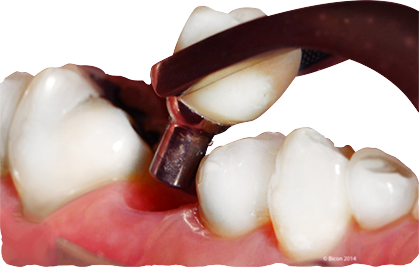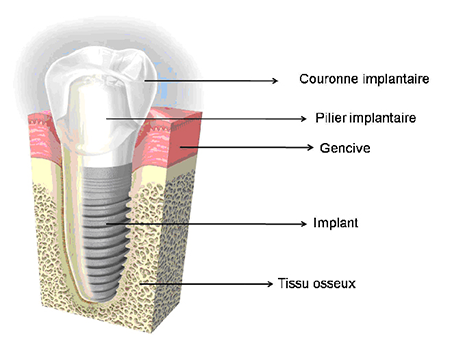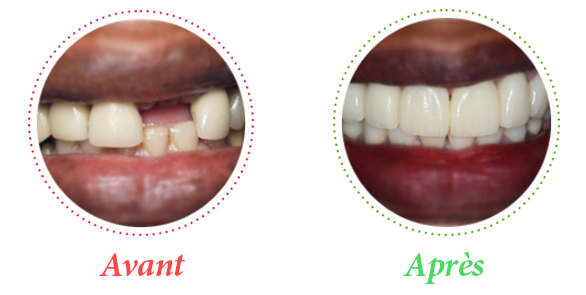Implantology
IMPLANTOLOGY
Despite improved dental care, millions of people around the world suffer from the loss of one or more teeth-mainly due to tooth decay, gingivitis (gum disease), or injury. For many years, the only options available for people with missing teeth were bridges and dentures. But today, dental implants are the treatment of choice to replace lost or damaged teeth, without the use of dentures, partials or crowns.
The patient needs a sufficient bone volume to be firmly implanted. Before any dental implant placement, the quantity and quality of the bone must be evaluated as accurately as possible by means of radiological examinations. If the bone proves to be insufficient, it is sometimes necessary to provide a pre-implant bone graft.



Dental implants: definition
Dental implants are replacement roots for teeth. The implants provide a solid foundation for the new or replacement fixed or removable teeth. The new teeth are made to match as much as possible to your natural teeth.
In which case is dental implant treatment recommended?
If only one tooth is missing, the placement of a dental implant gives the best solution because it is not necessary to touch the neighboring healthy teeth. If several teeth are missing, to be able to lay a particular bridge, the solution is the dental implant that will allow the prosthesis to attach more easily. If all the teeth are missing, thanks to the placement of 6 to 8 implants, it is possible to fix a complete prosthesis or bridge. Just a few implants can be used to stabilize a denture that will not move while eating or speaking. This gives a more comfortable and natural feeling.
What are the benefits of dental implants?
There are many benefits to dental implant placement:
Improved aesthetics: dental implants look like your natural teeth. And because they are designed to merge with the bone, they become permanent.
Improved speech: With removable dentures, prostheses can slip into your mouth and interfere with your speech. Dental implants help to prevent this kind of problem.
Improved comfort: because it is fixed directly in the bone, the implant is an integral part of the dentition. It eliminates the discomfort of removable dental prostheses.
Easy chewing: Dentures can make chewing difficult. Dental implants work like your own teeth, and allow you to eat your favorite foods without pain.
Improved self-esteem: Dental implants can give you back your smile and help you feel better about yourself.
Improved oral health: Because the neighboring teeth are not modified to support the implant, your own teeth are left intact. Individual implants also facilitate daily brushing.
Durability: Implants usually last for many years. With good care, the majority of implants last a lifetime.
What are the success factors of implant placement?
The success rate of implanting dental implants vary depending on where they will be inserted into the jawbone. In general the success rate is about 95%. With proper care, implants can last a lifetime.
Can everyone be eligible for implant placement?
In most cases, anyone who is healthy enough to undergo routine tooth extraction or oral surgery may be a good candidate for dental implantology. The patient must have healthy gums and enough bone to maintain the implant. He must also make sure of good oral hygiene and regular visits to the dentist. Heavy smokers, people with uncontrolled chronic conditions – such as diabetes or heart disease – or patients who have had radiation therapy should be evaluated individually. If you are considering implant placement, talk to your dentist about it.
The stages of implant placement
Implant placement and loading will be done in 2 steps:
Step 1: After the consultation and a personal examination, the dentist will develop a treatment plan. We can proceed to the establishment of one or more implants under local anesthesia, as a simple tooth extraction. Then a healing period of 3 months is mandatory for bone integration. A stay of 3 to 4 days will be necessary a first time.
2nd step: after about 3 months, a pillar will be screwed on each implant, we will take the prints and we will send them to the laboratory for the fabrication of dental prostheses. A duration of at least 5 days will therefore be necessary for the loading of dental implants.
Is the implant placement painful?
Most people who have dental implants say that there is very little discomfort involved in the procedure. This is a routine operation that does not present any particular risk to the health of the patient. Most patients report that implants involve less pain than tooth extraction. After the dental implant placement, mild pain can be treated with painkillers prescribed by the practitioner.
What are the precautions to take after implant placement?
Dental implants require the same care as real teeth, including brushing, antibacterial mouthwashes, and regular checkups at the dentist.

